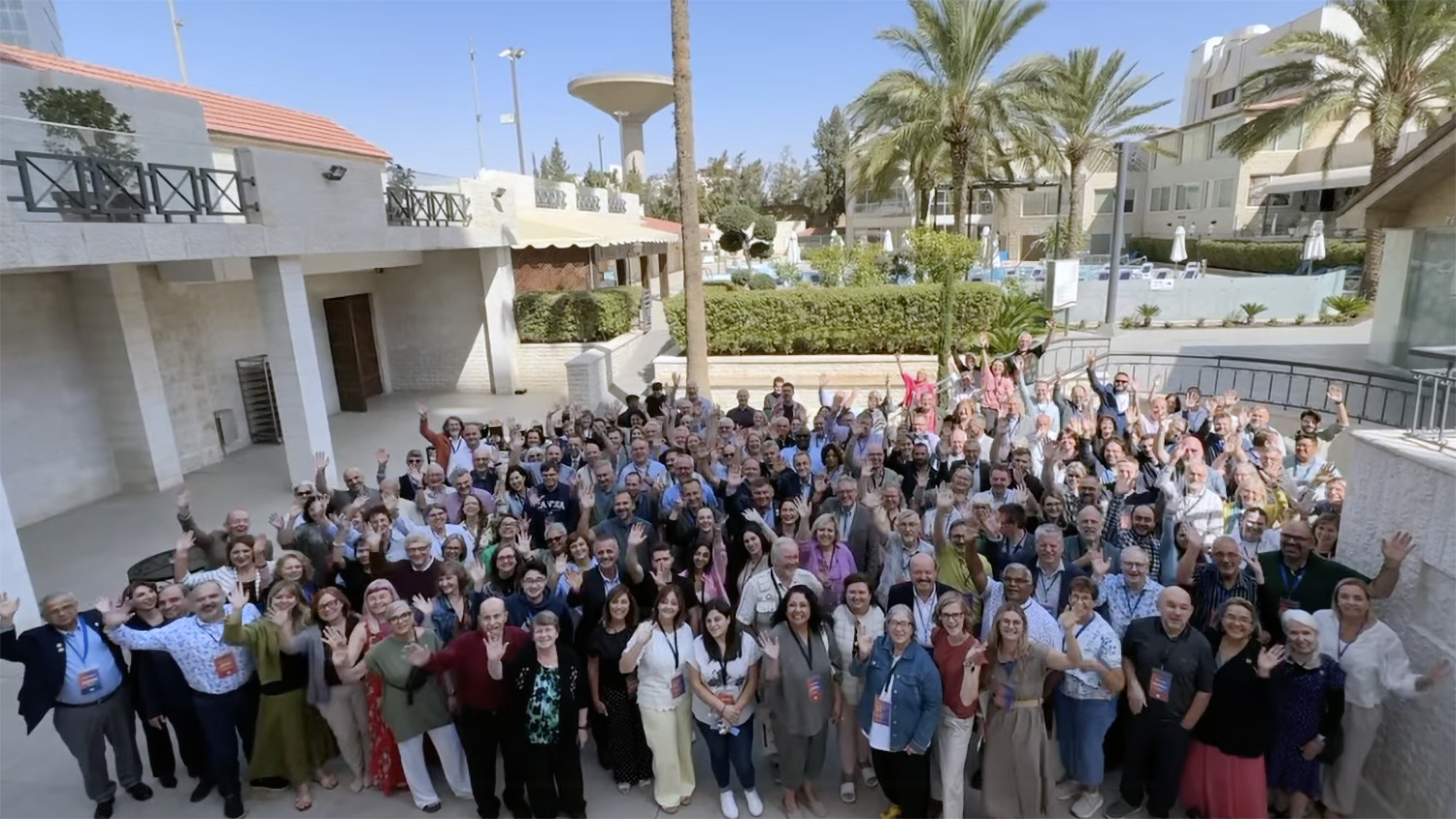
(RNS) — In the heart of Muslim-majority Jordan, a remarkable shift is taking place in global Christianity. For decades, evangelical Christians, particularly those in the United States, have viewed the Middle East through the lens of Christian Zionism, a staunchly pro-Israel and, recently, pro-war outlook. Recent developments, however, show the rest of the evangelical world moving away from a politically centered theology toward one rooted in Christ’s teachings of justice, mercy and the need to spare all lives made in God’s image.
In late September, Amman, Jordan, hosted the 75th anniversary of the European Baptist Federation, the network of Baptist churches that includes the Middle East under the umbrella of the Baptist World Alliance. As 200 leaders from 45 countries met for the first time in an Arab capital, Jordanian government officials welcomed the visitors, including Ahmad Safadi, speaker of Jordan’s parliament, and attended parts of the conference. The Rev. Charlie Costa of Lebanon was consecrated as the EBF’s president, becoming the first Arab to hold this position.
In a related milestone, the Rev. Nabeeh Abbasi, president of the Jordanian Baptist Convention, was appointed the Baptist World Alliance’s first-ever ambassador to the Middle East, a role dedicated to fostering dialogue, coexistence and peace across the region. In his remarks at the celebration, Abbasi said the new title allows him to strengthen Jordan’s image and promote a culture of harmony: “This position represents a great opportunity to serve our region in line with the humanitarian message of the Christian faith, which aligns fully with the values of the Kingdom, championed by His Majesty the King: peace, dignity, and justice for all.”
A month earlier, Botrus Mansour, a Palestinian citizen of Israel, was elected secretary general of the World Evangelical Alliance, which represents more than 600 million evangelical Christians worldwide. Mansour, a longtime director of Baptist schools and organizations, previously headed the Federation of Evangelical Councils in Jordan, Palestine and Israel. That council’s rotating presidency was also celebrated in Amman, with Jordan’s council leader, retired Gen. Imad Maayeh assuming the role. Maayeh’s last duty in the Jordanian army was removing landmines left from the Arab-Israeli wars in the East Bank of Jordan, making way for pilgrims to visit the baptismal site of Jesus, known in the Gospel of John as “Bethany beyond the Jordan.”

Botrus Mansour. (Photo courtesy of World Evangelical Alliance)
These appointments are more than ceremonial. While testifying to Jordan’s long-standing commitment to religious tolerance under King Abdullah II, they also show that evangelical Christianity is increasingly distancing itself from U.S.-centric political agendas. Evangelicals are reclaiming the moral and prophetic dimensions of their faith — centering it not on political loyalty or territorial claims, but on principles of justice, mercy and human dignity.
Pastor Yohanna Katanacho, a Palestinian Christian scholar born in Jerusalem, delivered four lectures at the EBF conference showing how this shift in transformation is working. Emphasizing the Old Testament through a Christ-centered lens, highlighting God’s desire for justice, mercy and peace for all people, Katanacho argued that the Bible is not a tool to justify hatred or political agendas, but a guide for embodying love and compassion in practical ways, particularly toward the oppressed.
Concepts like these may seem nothing more than basic Christian values. But they represent a profound reorientation in evangelical thought about how to approach life in the Holy Land. Faith leaders are increasingly challenging the assumption that faith must serve hardline political ends, instead championing a Christianity that is courageous, compassionate and rooted in the transformative message of Jesus Christ. Evangelicals in Jordan, the Middle East and around the world are modeling a faith that prioritizes reconciliation over division, justice over favoritism and the protection of life over partisan allegiance.
The shift is not just theological — it is ethical and prophetic. By celebrating diversity, supporting human rights and promoting interfaith coexistence, these leaders are redefining what it means to follow Christ in the modern world.
The question now is whether the broader evangelical world will embrace this path. Will it move decisively toward a faith that values justice, mercy and life above political alignment? The events in Amman suggest that a new chapter is beginning, one in which Christianity returns to its roots: a faith for all people, grounded in the love, compassion and moral clarity of Christ.
The question for the evangelical world is clear: will it follow the path of Christ’s love, justice and mercy or remain tethered to hawkish political agendas? The Amman events offer a compelling answer.
(Daoud Kuttab is a Palestinian Christian and a member of the Amman Baptist Church. He publishes Milhilard.org, a Christian news site dedicated to communities in Jordan and Palestine, and is the author of “State of Palestine NOW.” Follow him on X @daoudkuttab. The views expressed in this commentary do not necessarily reflect those of Religion News Service.)
